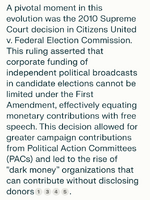Jimmy Higgins
Contributor
- Joined
- Jan 31, 2001
- Messages
- 50,578
- Basic Beliefs
- Calvinistic Atheist
That's bullshit! *goes to look it up*The average Congress introduces about a hundred Constitutional Amendments.I figure they will if they think it will pass.... which would require the Democrats to write one.PR (at a national level at least) would require a Constitutional Amendment...Let me know when the SCOTUS overturns their law introducing proportional representation.
Okay... ummm... not bullshit.
Personally, I think part of it is inertia, the other part is, they want to test it out first. Yes, the Democrats don't want to open things up for a third party to swoop in, but if anyone is to gain from a preferred choice, the Democrats would because the more votes, the better they usually do.Thinking their ideas won't pass evidently doesn't stop Congressthings from writing them.
Regardless, redistricting is our biggest issue. We have a huge election coming up... and maybe about 1 in 10 House seats up for grabs. Nationally, fixing that could (I emphasize the italics that it is only a could) help, because if 150 seats are open, the money would, in theory, need to stay more local.



